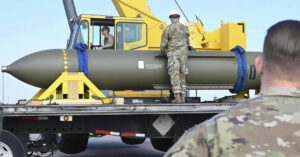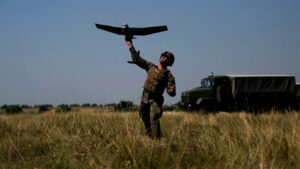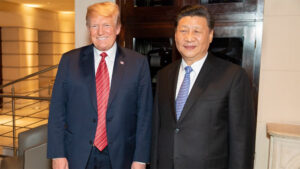FOR MORE ON THE FUTURE OF POLAND, SEE DISUNITED NATIONS
This next country might surprise some of you, but deglobalization might give Poland its moment of fame. That’s if they play their cards right, and even then, it will be a fleeting moment, but a moment in the spotlight nonetheless.
Historically, Poland’s been vulnerable to major powers like Russia and Germany, so they’ve developed quite the arsenal for defense. Now, a window of opportunity might open as Germany and Russia face economic and demographic decline.
The time is coming for some strategic decisions to be made. Will a conflict between Russia and Poland unfold, or will Poland buddy up with Sweden? Either way, Poland’s surge to the spotlight will be short-lived but gripping.
Here at Zeihan On Geopolitics we select a single charity to sponsor. We have two criteria:
First, we look across the world and use our skill sets to identify where the needs are most acute. Second, we look for an institution with preexisting networks for both materials gathering and aid distribution. That way we know every cent of our donation is not simply going directly to where help is needed most, but our donations serve as a force multiplier for a system already in existence. Then we give what we can.
Today, our chosen charity is a group called Medshare, which provides emergency medical services to communities in need, with a very heavy emphasis on locations facing acute crises. Medshare operates right in the thick of it. Until future notice, every cent we earn from every book we sell in every format through every retailer is going to Medshare’s Ukraine fund.
And then there’s you.
Our newsletters and videologues are not only free, they will always be free. We also will never share your contact information with anyone. All we ask is that if you find one of our releases in any way useful, that you make a donation to Medshare. Over one third of Ukraine’s pre-war population has either been forced from their homes, kidnapped and shipped to Russia, or is trying to survive in occupied lands. This is our way to help who we can. Please, join us.
TranscripT
Hey, everybody. Peter Zeihan here. Coming to you from the Eagle Nest Wilderness in central Colorado on top of Eccles Peak with a buffalo pass there below and behind me. Today, we’re going to go back into that post American series I’ve been doing every once in a while and specifically talking about one of the hot spots. And that will be Poland.
Now, Poland is one of those countries that we don’t think of very often as a major power because it has been so badly treated throughout history. It’s got major powers around it, specifically Sweden, Russia and Germany, and it tends to get gobbled up by them very easily. It’s coastline isn’t great and so the Swedes have always been able to protect upon them.
And then its land borders with both the Germans and the Russians are wide open. So there’s no chance of doing any sort of static defense. As such, the Polish military in modern times is heavy on air power with extended range fuel tanks, so that while they might not be able to stop a Russian invasion, they can reach Moscow and bomb it and at least make the Russians think twice.
That’s kind of the national strategy here. And then, of course, they’re never sure if they can rely upon the Germans, because every time the Germans have gone on the warpath, Poland is usually one of the first couple of stops. Things are going to change over the course of the next 20 years for a number of reasons. But really the biggest chunk is economics and demography.
The Germans and the Russians have two of the worst demographics structures on the planet. And while Sweden is an up and coming power again and it can definitely punch above its weight, this is not the 1600s. And Sweden today has under 10 million people. So even if it punches like triple its weight, Poland still has 40 million people.
Also, the Swedes these days are not looking to expand into empire. So, you know, there’s that anyway. What this means is that we’re seeing an opening window of opportunity for Poland as the German system fails because of demographic decline and economic collapse. Remember, this is a country that exports everything. So anything happens to globalization, they’re done. Also, they can’t maintain their workforce for more than another ten years.
Russia is only slightly behind that in terms of demographic decline. In fact, once you look at the health figures, it’s probably worse. Everyone in Germany at least is in decent health. You’ve got a lot of alcoholism and a lot of HIV and a lot of tuberculosis in Russia. You don’t have any of those in Poland, which means that for the Russians, things are going to go one of two directions.
Either number one, they’re going to win hand over fist in Ukraine, and then they’re going to come for Poland. And we’re going to have a knockdown, drag out fight at some point over the next 20 years, the Russian wave will crest and then it will fall back because they won’t be able to maintain their military structures. And we’ll have the poles being more and more and more aggressive, assuming they don’t fall completely and pushing into the former Russian space in order to break it up so nothing like that can ever happen again.
For those of you who don’t think that that can happen, it’s happened before. The Russians call it the time of troubles and that brings us to the second possibility that in Ukraine, that this is all that the Russians can do and this war will break them in the next few years. And then the Poles will push more and more aggressively into the Russian space to make sure that nothing like that ever happens again.
Remember, in the 1600s, 16 04i believe the Poles actually occupied Moscow and held it for a generation. Only this time the Russians would be in economic and demographic decline, if not outright collapse. So it might actually last a little bit longer. Now, for those of you who are Polish, don’t do too much chest beating. And a lot of things have to happen.
Poland, like Romania, really only does well when the country’s on its edges are weak. The problem you have in Poland is it’s just big enough to think that it can pull this off by itself, whereas the Romanians know that they have to partner with somebody. Now there are two paths for the Poles to take. Option number one is economic collapse and statist economy, followed by a military expansion.
That’s probably the most likely outcome. Remember that Poland, today’s economically wealthy because of its relationship with German manufacturing. If that goes away, option number two is the sweet step and become the new partner, both demographically, economically, strategically. And you get Polish land power with Swedish amphibious power. And that can be a very potent combination in the Baltic, sharing a lot of common values and maybe even having a vector of American assistance in their boats.
Kind of a the playbook, as I see it right now. And finally, before polls get too excited, keep in mind that Polish demographics are not all that much better than Russian or German. I mean, they’re better, but they’re aging just as fast, just from a younger base. So if we’re looking at an end to the German and the Russian systems over the next ten to 20 to 30 years, we’re also looking at a complete fabrication of the Polish system over the next 20 to 50 years.
So there’s going to be a window here where Poland becomes the most powerful land power in the region, and it is a moment in time. And what the Poles decide to do with that is going to reshape this region for at least the next century. All right, you guys later.








